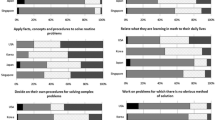Abstract
This paper presents and discusses some of the findings of a research project that focused on teaching and learning in two high-school mathematics classrooms. The focus of the study was to consider the ways in which teachers’ classroom interventions promote the growth of students’ mathematical understanding. Analysis of the data resulted in the generation of a number of themes describing the teachers’ interventions. One of these themes, that I callblocking, is the subject of this paper. The paper discusses the implications of this intervention strategy for teaching, learning, research, and teacher education.
Similar content being viewed by others
References
Bishop, A. (1988).Mathematical enculturation: A cultural perspective on mathematics education. Dordrecht, The Netherlands: Kluwer.
Borasi, R., Siegel, M., Fonzi, J., & Smith, C. (1998). Using transactional reading strategies to support sense-making and discussion in mathematics classrooms: An exploratory study.Journal for Research in Mathematics Education, 29(3), 275–305.
Chazan, D., & Ball, D. (1995).Beyond exhortations not to tell: The teacher’s role in discussion-intensive mathematics classes. Craft Paper 95-2. Michigan State University, MI: National Center for Research on Teacher Learning. http://ncrtl.msu.edu/http/craftp/html/cp952.htm.
Chuska, K. (1995).Improving classroom questions. Bloomington, IN: Phi Delta Kappa.
Clarke, D. (1999). Classroom reform five years down the track: The experience of two teachers.Mathematics Education Research Journal, 11(1), 4–24.
Cobb, P., Boufi, A., McClain, K., & Whitenack, J. (1997). Reflective discourse and collective reflection.Journal for Research in Mathematics Education, 28(3), 258–277.
Davis, B. (1996).Teaching mathematics: Toward a sound alternative. New York: Garland.
Dillon, J. (1987). The multi-disciplinary world of questioning. In W. Wilen (Ed.),Questions, questioning techniques and effective teaching (pp. 49–66). Washington, DC: National Education Association.
Dillon, J. (1988).Questioning and teaching: A manual of practice. New York: Teachers College Press.
Edwards, A. (1980). Patterns of power and authority in classroom talk. In P. Woods (Ed.),Teacher strategies: Explorations in the sociology of the school (pp. 237–253). London: Croom Helm.
Edwards, D., & Mercer, N. (1987).Common knowledge: The development of understanding in the classroom. London: Methuen.
Frid, S., & Malone, J. (1994, April).Negotiation of meaning in mathematics classrooms: A study of two Year 5 classes. Paper presented at the annual meeting of the American Educational Research Association, New Orleans, LA.
MacGregor, M., & Stacey, K. (1998). Cognitive models underlying algebraic and nonalgebraic solutions to unequal partition problems.Mathematics Education Research Journal, 10(2), 46–60.
Martino, A., & Maher, C. (1994, April).Teacher questioning to stimulate justification and generalization in mathematics. Paper presented at the annual meeting of the American Educational Research Association, New Orleans, LA.
Mulligan, J., & Watson, J. (1998). A developmental multimodal model for multiplication and division.Mathematics Education Research Journal, 10(2), 61–86.
Pirie, S., & Kieren, T. (1991). Folding back: Dynamics in the growth of mathematical understanding. In F. Furinghetti (Ed.),Proceedings of the fifteenth annual meeting of the International Group for the Psychology of Mathematics Education (Vol. 3, pp. 169–176). Assisi, Italy: PME Program Committee.
Pirie, S., & Kieren, T. (1994). Growth in mathematical understanding: How can we characterise it and how can we represent it?Educational Studies in Mathematics, 26(2–3), 165–190.
Postman, N., & Weingartner, C. (1969).Teaching as a subversive activity. New York: Delacorte.
Reynolds, A., & Wheatley, G. (1992). The elaboration of images in the process of mathematics meaning making. In W. Geeslin & K. Graham (Eds.),Proceedings of the sixteenth annual meeting of the International Group for the Psychology of Mathematics Education (Vol. 2, pp. 242–249). Durham, NH: PME Program Committee.
Stevens, M. (1990). Communication in the mathematics classroom. In. L. Steffe & T. Wood (Eds.),Transforming children’s mathematics education (pp. 228–234). Hillsdale, NJ: Lawrence Erlbaum.
Towers, J. (1994).The beginnings of formal algebraic understanding. Unpublished masters thesis, Oxford University.
Towers, J. (1998a).Teachers’ interventions and the growth of students’ mathematical understanding. Unpublished doctoral dissertation, University of British Columbia.
Towers, J. (1998b). Telling tales.Journal of Curriculum Theorizing, 14(3), 29–35.
Towers, J. (2000, April).Teachers’ interventions and the growth of students’ mathematical understanding. Paper presented at the annual meeting of the American Educational Research Association, Seattle, WA.
Vacc, N. (1993). Questioning in the mathematics classroom.Arithmetic Teacher, 41(2), 88–91.
van Hiele-Geldof, D. (1984). The didactics of geometry in the lowest class of secondary school. In D. Fuys, D. Geddes, & R. Tischler (Eds.),English translation of selected writings of Dina van Hiele-Geldof and Pierre M. van Hiele (pp. 1–214). Brooklyn, NY: Brooklyn College, School of Education. (ERIC Document Reproduction No. ED287697)
Varela, F., Thompson, E., & Rosch, E. (1991).The embodied mind: Cognitive science and human experience. Cambridge, MA: MIT Press.
Watson, K., & Young, R. (1986). Discourse for learning in the classroom.Language Arts, 63, 26–33.
Author information
Authors and Affiliations
Rights and permissions
About this article
Cite this article
Towers, J. Blocking the growth of mathematical understanding: A challenge for teaching. Math Ed Res J 14, 121–132 (2002). https://doi.org/10.1007/BF03217357
Issue Date:
DOI: https://doi.org/10.1007/BF03217357




